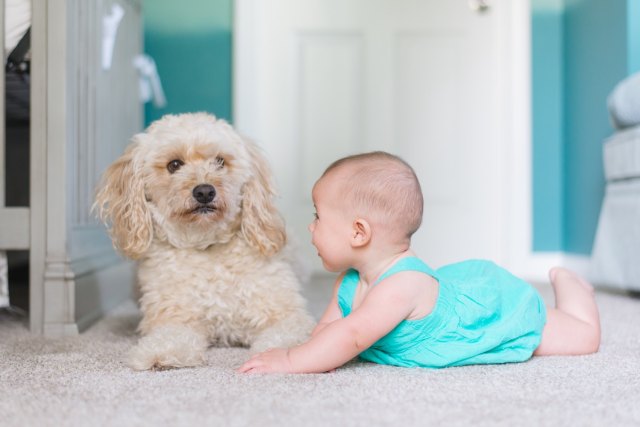As the mother of two young children and someone who grew up with animals, I have always believed that pets are good for kids—and there’s a growing body of scientific evidence proving what I have always known to be true. Yet despite this, most of us with kids and pets have experienced “the look.”
What I am referring to, of course, is “the look” you get from one of your friends who doesn’t have animals, when they see your dog lick your kid’s face or worse, the absolute terror on their face when your dog licks their kid. We all have those friends: the “non-animal” people who just don’t get it.
As a veterinarian and animal lover who has always had a household full of pets, I have endured many looks and comments. “You let the dog in the house around the kids?” “The cat sleeps in the bed?” “Aren’t you afraid the dog is going to give them something?” Not only are most of these concerns unfounded, it turns out that having a pet around kids is actually good for their health.
So how are pets good for our kids? In addition to teaching them empathy, responsibility and love, pets can make great friends and companions for children. Pets also show kids how to express love by petting, being gentle, hugging and kissing. Pets have been shown to help children overcome shyness, develop trust and enhance their social skills. As if that wasn’t enough, science has shown that pets also offer health benefits to children.
A study by Dr. James Gern from the University of Wisconsin-Madison found that infants who grew up with pets were less likely to develop asthma and allergies. He evaluated blood samples from infants shortly after birth and after their first birthday and looked for changes in their immune system or evidence of allergic reactions. His research supported previous studies that have shown that allergies, eczema and asthma occur less frequently in children with pets. In addition, animals have been proven to help with stress, anxiety, depression, autism, ADD and other psychological issues.
Our course, there are caveats. As much as I love and adore pets, I recognize that they are animals and they could harm a child if provoked or because of food or toy aggression. Even if you “know” your pet, supervise their interactions with kids to ensure that your pet doesn’t show ANY signs of aggression.
Likewise, teach your children to respect animals: never allow them to tease or take away food or toys from pets. Finally, exercise common sense. Even the most mild-mannered Labrador Retriever could inadvertently hurt an infant if they get too rambunctious. When it comes to children and pets, my maternal instincts always trump the animal lover in me. I always choose what is safest for my kids.
Besides having a well-behaved pet, you want to make sure they are healthy. Take your pet to the veterinarian for regular veterinary visits and yearly parasite checks (fecals). Keeping your pet on year-round parasite preventatives will protect your pet from external and internal parasites and can help protect your household from zoonotic diseases (diseases spread from animals to people).
Making sure your pets and kids know how behave with each other and knowing that your household is protected against zoonotic diseases is worth the effort when you consider all the great benefits that your kids can reap from having pets in their lives. So the next time someone without pets gives you “the look,” just smile and know that your pets are actually good for your kids.
